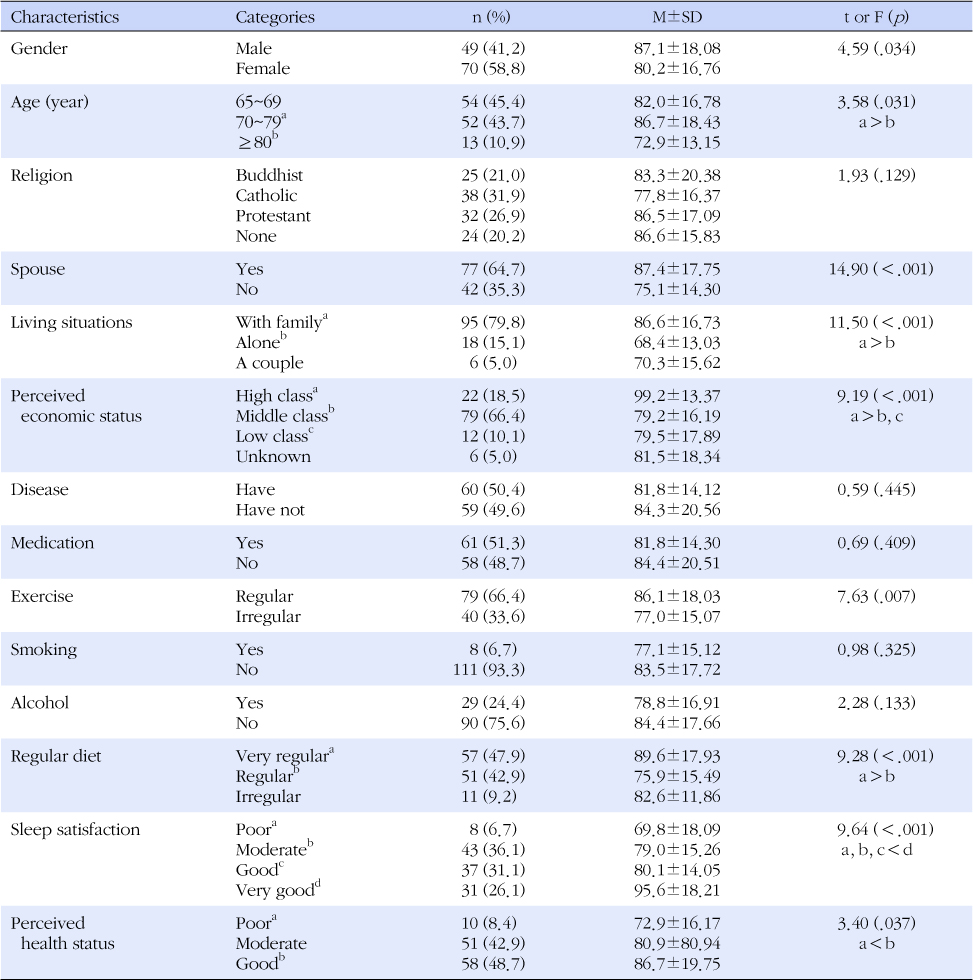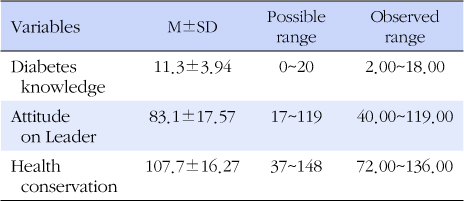Articles
- Page Path
- HOME > J Korean Acad Community Health Nurs > Volume 25(2); 2014 > Article
-
Original Article
- Factors Affecting Highly Educated Elders' Diabetic Health Leader Attitude
- Kiwol Sung, Jiran Nam, Mijin Yu
-
Journal of Korean Academy of Community Health Nursing 2014;25(2):119-127.
DOI: https://doi.org/10.12799/jkachn.2014.25.2.119
Published online: June 30, 2014
1College of Nursing, Catholic University of Daegu, Daegu, Korea.
2Department of Nursing, Young-Nam Foreign Language College, Gyeongsan, Korea.
• Received: January 16, 2014 • Revised: June 1, 2014 • Accepted: June 17, 2014
© 2014 Korean Academy of Community Health Nursing
This is an Open Access article distributed under the terms of the Creative Commons Attribution Non-Commercial License (http://creativecommons.org/licenses/by-nc/3.0/) which permits unrestricted non-commercial use, distribution, and reproduction in any medium, provided the original work is properly cited.
- 616 Views
- 0 Download
Abstract
-
Purpose
- This study was done to identify the relationships among diabetic health leader attitude, diabetic knowledge, and health conservation in highly educated elders.
-
Methods
- The participants were 119 elders aged 65 or more who were attending the senior welfare centers in D and K City and had at least a high school degree. Data were collected from June 10 to July 7 in 2013. Data analysis included one-way ANOVA, independent t-test, Pearson's correlation, and stepwise multiple regression, done with the SPSS/WIN 19.0 program.
-
Results
- A positive correlation was found among diabetic health leader attitude, diabetic knowledge, and health conservation. Health conservation explained 26% (β=.31) and diabetic knowledge explained 2% (β=.18) of the variance in diabetic health leader attitude.
-
Conclusion
- The results indicate that to increase diabetic health leader attitude among highly educated elders, health leader programs are needed for increasing their diabetic knowledge and health conservation.
-
This work was supported by research grants from the Korean Health Prmotion Foundation in 2013.
NOTES
- 1. Jeong GH, Oh YH, Lee YG, Son CG, Park BM, Lee SY, et al. 2011 Senior survey. Policy Report. Seoul: Ministry of Health and Welfare & Korea Institute for Health and Social Affairs; 2012. 04;Report No.: 11-1352000-000672-12.
- 2. Statistics Korea. Census. [Internet] Seoul: Statistics Korea; 2012;cited 2013 October 19. Available from: http://kostat.go.kr/portal/korea/kor_nw/2/6/2/index.board?bmode=read&bSeq=&aSeq=308559&pageNo=1&rowNum=10&navCount=10&currPg=&sTarget=title&sTxt=
- 3. Kim MS. Factors related to life satisfaction of elderly patients with hypertension: centering on subjective health status and health promoting behaviors [master's thesis]. [Busan]: Catholic University of Pusan; 2011. 54 p.
- 4. Choo JA. Lay health leaders are part of solution In: Paper presented at: The meeting of the Korean Academy of Community Health Nursing. Seoul: 2012;12.
- 5. Choi YH, Kim NY. The effects of an exercise program using a resident volunteer as a lay health leader for elders' physical fitness, cognitive function, depression, and quality of life. J Korean Acad Community Health Nurs. 2013;24(3):346–357. http://dx.doi.org/10.12799/jkachn.2013.24.3.346Article
- 6. Hyun SH, Lee GY. Effects of a women's health leader education program for middle-aged in an urban area. Health Soc Welf Rev. 2012;32(4):551–576. Article
- 7. Kim SH. Effects of a volunteer-run peer support program on health and satisfaction with social support of older adults living alone. J Korean Acad Nurs. 2012;42(4):525–536. http://dx.doi.org/10.4040/jkan.2012.42.4.525ArticlePubMed
- 8. Virginia Division for the Aging of the Department for Aging and Rehabilitative Services. Virginia Chronic Disease Self-Management Program (CDSMP) evaluation report [Internet] Virginia: Virginia division for the aging of the department for aging and rehabilitative services; 2012;cited 2013 October 10. Available from: http://patienteducation.stanford.edu/programs/cdsmp.html
- 9. Statistics Korea. The elderly statistics. [Internet] Seoul: Statistics Korea; 2012;cited 2013 November 10. Available from: http://kostat.go.kr/portal/korea/kor_nw/2/1/index.board?bmode=read&aSeq=260368
- 10. Korean Diabetes Association. Diabetes fact sheet in Korea 2012 [Internet] Seoul: Korean Diabetes Association; 2012;cited 2013 October 10. Available from: http://www.diabetes.or.kr/temp/Diabetes_Fact_sheet2012.pdf
- 11. Choi GA, Jang SM, Nam HW. Current status of self-management and barriers in elderly diabetic patient. Korean Diabetes J. 2008;32(3):280–289. http://dx.doi.org/10.4093/kdj.2008.32.3.280Article
- 12. Choi KI. The Relationships between knowledge of diabetes, barrier and compliance with sick role behavior of diabetic patients [master's thesis]. [Seoul]: Ewha Womans University; 2010. 73 p.
- 13. Bao Y. A Study on the leadership factors on the organization performances: China's Jilin enterprise as the center [master's thesis]. [Iksan]: Wonkwang University; 2011. 115 p.
- 14. Sung KW. Scale development on health conservation of the institutionalized elderly. J Korean Acad Nurs. 2005;35(1):113–124. ArticlePubMedPDF
- 15. Ha SH. A study on knowledge of elderly health care and attitude toward the elderly in home helpers [master's thesis]. [Jeonju]: Chonnam National University; 2007. 41 p.
- 16. Lee IJ. A research on the understanding of dementia by the aged [master's thesis]. [Chuncheon]: Hallym University; 2001. 56 p.
- 17. Shim WS, Hong SB, Choi YS, Choi YJ, An SH, Min KY, et al. Development of two parallel diabetes knowledge tests. J Korean Diabetes Assoc. 2006;30(6):476–486. Article
- 18. Seo JW. Education methods effect on the change of attitude [master's thesis]. [Seoul]: Ewha Womans University; 2000. 84 p.
- 19. Park SY. A Study on the correlation between diabetes patients' knowledge, self-care behavior and the educational demand [master's thesis]. [Seoul]: Sahmyook University; 2012. 68 p.
- 20. Oh WO, Kim EJ. Factors influencing health conservation among elders. J Korean Acad Fundam Nurs. 2009;16(2):134–143.
- 21. Shin YS, Kim EH. A study on health behaviors, health status and anxiety about aging for the elderly - focused on the elderly in senior center-. J Korean Acad Community Health Nurs. 2009;20(2):179–188.
- 22. Lim SC. Intervention strategies for older adults with diabetes. J Korean Diabetes. 2012;13(1):52–55. http://dx.doi.org/10.4093/jkd.2012.13.1.52Article
- 23. Castro CM, Pruitt LA, Buman MP, King AC. Physical activity program delivery by professionals versus volunteers: The team randomized trial. Health Psychol. 2011;30(3):285–294. http://dx.doi.org/10.1037/a0021980ArticlePubMedPMC
- 24. Jeong JG, Park HO, Lee CH. Study of activation measures and survey of elderly volunteers [Internet] Seoul: Ministry of Health and Welfare; 2009;cited 2013 October 16. Available from: http://www.prism.go.kr/homepage/researchCommon/retrieveResearchDetailPopup.do;jsessionid=E5F4496B90E69BD6DFF977C9D34D4128.node02?research_id=1351000-201000016
- 25. Kim SY, Lim CG. A study on the determinants of Korean seniors' leisure participation through group activities. J Korean Official Stat. 2011;16(1):26–47.
- 26. Kim SH, Kim YJ. The relationship between elderly leisure activity participation and recognition of successful aging. J Fam Relat. 2011;15(4):3–23.
- 27. Seo KS, Lee YJ. The effects of self-esteem, life satisfaction, and social participation desire on the social participation of the elderly. J Soc Issues. 2012;23(2):97–124.
- 28. Moon JS. A study on development of an elderly leadership program for successful aging and evaluation of its effects [dissertation]. [Seoul]: Seoul Christian University; 2008. 138 p.
Figure & Data
References
Citations
Citations to this article as recorded by 


 KACHN
KACHN




 PubReader
PubReader Cite
Cite

